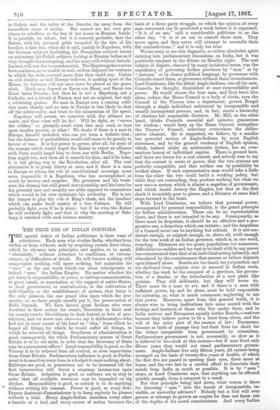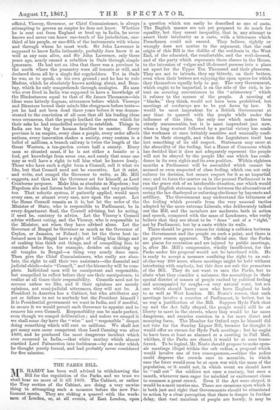HE TRUE USE OF INDIAN COUNCILS. T HE special defect of
Indian politicians is their want of eclecticism. Each man who studies India, whether from within or from without, ends by acquiring certain fixed ideas, which he elevates into principles, and applies, so to speak, "absolutely," without reference to conditions, or circum- stances, or difficulties of detail. He will borrow nothing, will compromise nothing, will spare nothing, but maintains his " view " as the one truth which can alone reinvigorate, or indeed "save," the Indian Empire. No matter whether his pet fancy is responsibility, or power, or railway communication, or great canals, or annexation, or the support of native States, or local government, or centralization, or the cultivation of individuality, or the establishment of system, that fancy is the only panacea, the one grand idea upon which the pro- sperity, or, as these people usually put it, the preservation of India depends. We have known great Indians who were Jacobins in their ardour for canals, Terrorists in their zeal for county courts, bloodthirsty in their hatred or love of pro- selytism, and we never met one—we say it deliberately—who had not in some corner of his head an "idea," from which he hoped all things, for which he would suffer all things, to which he referred all things. Steadiness of administration is good, consequently the whole Parliamentary system of Great Britain is to be set aside, in order that the Secretary of State may be a permanent officer Local responsibility is good, so the Viceroy is to be relieved from all control, or even supervision from Great Britain. Parliamentary influence is good, so Parlia- ment is to sanction every item in a budget it cares nothing about. Railways are good, so guarantees are to be increased till the first insurrection will throw a sixpenny income-tax upon Great Britain. Irrigation is good, so railways are to stop in order that all available resources may be expended on big ditches. Responsibility is good, so nobody is to do anything without writing his reasons. Power is good, so every Sub- Deputy Assistant-Commissioner is to hang anybody he pleases without a trial. Every Anglo-Indian considers every other a fanatic or a fool, and every course of action becomes the basis of a fierce party struggle, on which the opinion of every man concerned can be predicted a week before it is expressed. "It is of no use," said a considerable politician to us the other day, "it is of no use to consult these men. They never agree, and they never will attempt to reconcile their flat contradictions ;" and it is only too true.
We are sorry to see this dogmatic, or rather, absolutist spirit entering into parliamentary discussions on India, but it was positively rampant in the debate on Monday night. The real subject, of dispute, obscured by many incidental issues, was the expediency of governing Indian provinces by " men " or by "systems," or in clearer political language, by governors with Councils round them, or governors without those incumbrances. Lord Cranborne, like the ablest Anglo-Indians, was all for men. Councils, he thought, diminished at once responsibility and power. He would choose the best man, and then leave him alone, reduce the Home Council to a body of clerks, turn the Council of the Viceroy into a department, govern Bengal through a single individual unfettered by irresponsible and, usually incompetent persons, and, in fact, create a hierarchy of absolute but responsible dictators. Mr. Mill, on the other hand, thinks Councils essential and minutes guarantees- for wisdom ; would keep up the Home Council, strengthen the Viceroy's Council, introduce everywhere the delibe- rative element. He is supported, we believe, by a smaller but powerful section of Anglo-Indians, by most English statesmen, and by the general tendency of English opinion, which, trained under an aristocratic system, has an over- cautious horror of individual caprice. There is ground here, and there are forces for a real contest, and nobody rose to say that the contest is waste of power, that the two systems are- perfectly compatible, and that neither can by possibility be- worked alone. If each representative man would take a little from the other the two could build a working policy, but while they are contending, they produce nothing but what we- now see—a system which is almost a negation of government, and which would destroy the Empire, but that at the first shock it invariably goes to pieces, and a Dictator of some kind steps forward to the front. With Lord Cranborne, we believe that personal power, accompanied by personal responsibility, is the grand principle- for Indian administration. There can be no representation. there, and there is not intended to be any. Consequently, as there must be despotism, it should be an effective and a pro- gressive one, a despotism which can initiate ; and the despotism of a Council never can be anything but critical. It is not con- sistent enough, or original enough, or, above all, swift enough for the true work of an Indian governor, which is, in one word, founding. Distances are too great, populations too numerous, difficulties too sudden and too vast to be dealt with by any power- less concentrated than that of an individual acting instantly, and stimulated by the consciousness that success or failure depends upon himself alone. Boards are too timid, too purposeless, and too sheltered from opinion ever to succeed in Indian work, whether the work be the conquest of a province, the preven- tion of a famine, or the introduction of a new plant like quinine. They will deliberate, but they will never do. There must be a man to act, and if there is a man with- sufficient power, he, and he alone, must be held responsible. for misusing, or, what is much commoner, neglecting to use that power. Moreover, apart from this general truth, it is. alwayswise to bring institutions into some accord with the- feelings and instincts of those who live under them, and in India natives and Europeans equally loathe Boards,—natives. because they believe power to be a trust from above, and the- will of the ruler part of the essence of law ; Europeans, because as birds of passage they feel their lives too short for- the delays inseparable from government by committee.. Parliamentary government is not, necessarily, so slow as it is believed to be—look at this session—but if men lived only fifteen years they would not stand parliamentary govern- ment. Anglo-Indians live only fifteen years, all careers being arranged on the basis of twenty-five years of health, of which the first five are passed in opening their eyes, three more at home, and the two last in a careful effort to dissociate their minds from India as much as possible. It is by "men alone, as Lord Cranborne says, that anything can be effected quickly enough, from a conquest to a canal. But that principle being laid down, what reason is there for throwing " men " into the hands of irresponsible, in- visible, or unworthy advisers ? Nobody but a fool will ever govern or attempt to govern an empire be does not knew out of the depths of his moral consciousness. And every Indian official, Viceroy, Governor, or Chief Commissioner, is always attempting to govern an empire he does not know. Whether he is sent out from England or bred up in India, he never knows and never can know one-tenth of his jurisdiction, one- third of his people, or one-fifth of the instruments with whom and through whom he must work. Sir John Lawrence is supposed to know India intimately, probably does know it as well as any man alive, and Sir John Lawrence, only three years ago, nearly caused a rebellion in Oude through simple ignorance. He had not an idea that there was a province in the north where the peasantry were all tenants at will, and declared them all by a single fiat copyholders. Yet in Oude he was, so to speak, on his own ground ; and he has to rule Madras, which he absolutely knows nothing about, and Bom- bay, which he only comprehends through analogies. No man who ever lived in India was supposed to have a knowledge of the Hindostanees equal to that of Sir James Thomason—his ideas were latterly dogmas, utterances before which Viceroys and Directors bowed their minds like clergymen before texts— yet he had not been dead three years before it was demon- strated to the conviction of all men that all his leading ideas were erroneous, that the people loathed the system which for their sake he had remodelled society to establish. Things in India, are too big for human faculties to master. Every province is an empire, every class a people, every order affects nations, every innovation shakes a society, every custom is a belief of millions, a branch railway is twice the length of the Great Western, a tea-garden covers half a county. Every man so situated must, if he is not either a fanatic or a fool, get knowledge from some one, and, surely that some one may as well have a right to tell him what he knows freely. Those who have such a right form a Council, call it what we like, but that Council need not be executive.. Let it exist, and write, and compel the Governor to write, as Mr. Mill • suggests, and then let the Governor act for hiraSelf, as Lord Cranborne proposes. Make him as absolute as Napoleon ; but Napoleon sits and listens before he decides, and very patiently too. That–edectic system, if patiently applied, would meet every case, or almost every case, now upon the carpet. Let the Home Council remain as it is, but let the order of the Minister of State, who is responsible to Parliament, be in every department final, the Council advising, but he acting, if need be, contrary to advice. Let the Viceroy's Council advise without voting, and the Viceroy, who is responsible to the Minister, act when they have advised alone. Let the Governor of Bengal be Governor as much as the Governor of Ceylon, or Jamaica, or Poland ; but let the three best in- formed men in Bengal have a right of telling him things and of making him think out things, and of compelling him to consider before he, for example, decides on shutting up all temples in Bengal—a thing very nearly done once. Then give the Chief Commissioners, who really are abso- lute, the right to call their two assistants—the financial and judicial chiefs—into "Council," and the hierarchy will be com- plete. Individual men will be omnipotent and responsible, but compelled to reflect before they use their omnipotence, to realize at all times their responsibility. Councils need not be screens unless we like, and if their opinions are merely opinions, not semi-judicial utterances, they will not be. A President in America has a Cabinet, but who attributes any act or failure to act to anybody but the President himself ? It is Presidential government we want in India, and if needful, to secure it we would permit each Governor to appoint and to remove his own Council. Responsibility can be made perfect, even though we compel deliberation ; and unless we compel it we shall some day have the " wise " and " responsible " despot doing something which will cost us millions. We shall not get many men more competent than Lord Canning was after 1860, and he produced the most dangerous incident which ever oceurred in India,—that white mutiny which almost startled Lord Palmerston into feebleness—by an order which he thought purely formal, and had probably never considered for five minutes.































 Previous page
Previous page